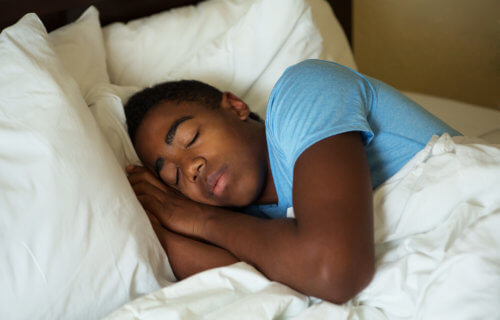EAST LANSING, Mich. — From mental health to physical fitness, studies show sleep is one of the best medicines for your body. A study by Michigan State University finds the powers of sleep have even greater benefits for teens. Researchers say teens who get the recommended amount of rest are able to focus more in class and even deal with difficult social situations better.
Looking at 256 ninth-graders, the study finds adolescents with adequate sleep are able to handle discrimination, racial bias, and solve problems more effectively. They are also more likely to seek support from a peer when facing difficult issues. The teens wore an actigraphy watch that tracks physical activities at one-minute intervals. This tests their sleep-wake state every day for two weeks.
Peer support
Each day, the youths were also asked to fill out a survey sharing their daytime experiences, such as how they respond to social stress, discrimination, and how these things impact their mental well-being. The results show teens are more successful helping their peers through daily stressors than each youngster’s parents are.
“Compared to parents, peers are likely to be witnessing and involved in adolescents’ experiences of ethnic or racial discrimination on a daily basis,” MSU’s Yijie Wang says in university release. “As such, they’re more of an immediate support that backs up adolescents and comforts them when discrimination occurs.”
Researchers say limiting electronic usage, quieting the sleeping area, and having a regular bed time can effectively help teens get adequate rest. They add this is where parents find their support being most important to a child’s development.
Proper sleep helps teens deal with the challenges growing up
Study authors believe teens have it a little rougher than younger children or adults. With early school times, constant changes in hormones, social stress, and transitioning into high school environments and relationships, teens need as much sleep as possible to deal with life’s happenings.
“Understanding how sleep helps adolescents negotiate social challenges may consequently elucidate how promoting sleep may improve adolescent adjustment during high school and beyond,” the assistant professor of human development and family studies adds.
MSU researchers say discrimination can bring about fatigue and having adequate rest can help teens deal with this harsh realty.
“This study did not treat sleep as a consequence of discrimination,” Wang explains. “However, our team did identify the influence of discrimination on same-day sleep in other studies. These studies showed that, on days when adolescents experienced ethnic or racial discrimination, they slept less and also took longer to actually fall asleep.”
Sleep doesn’t make issues or stressors disappear completely, but they do help with dealing with these problems which can occur daily.
“The promotive effect of sleep is so consistent,” Wang concludes. “It reduces how much adolescents ruminate, it promotes their problem solving and it also helps them to better seek support from their peers.”
The study is published in the journal Child Development.
